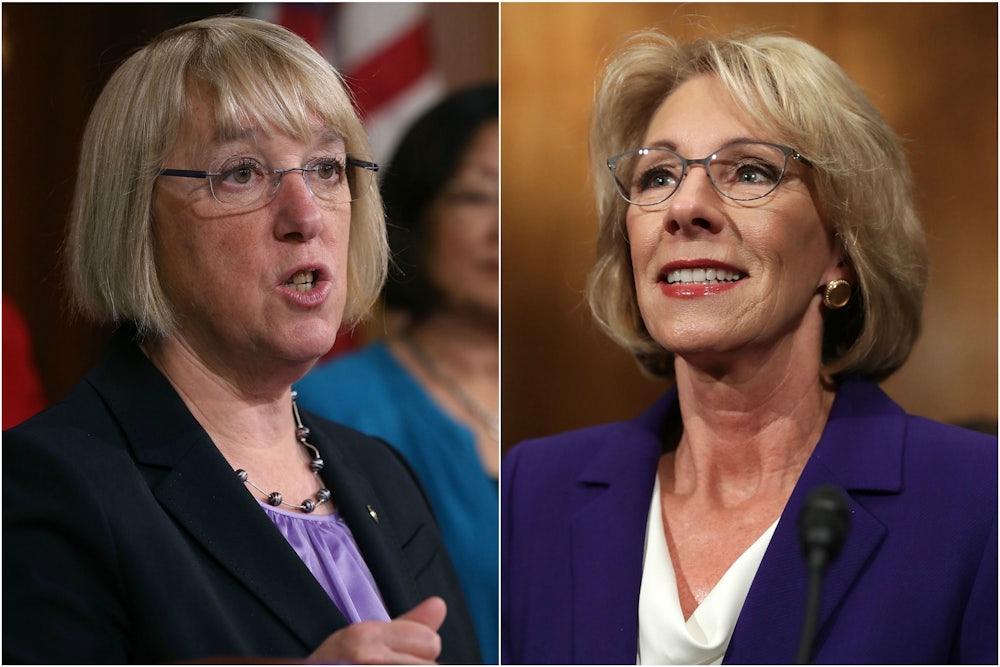As Senator Patty Murray tells it, Luke was a middle-school boy who used a private school voucher program to attend Manatee Learning Academy in Bradenton, Florida. He did well at Manatee, but when he tried to switch schools for tenth grade, he realized his credits wouldn’t transfer since Manatee—unbeknownst to him and his family—lacked accreditation.
“For all those glossy voucher program brochures,” Luke’s grandmother Nadell Northrop wrote in a Medium post for the American Federation of Teachers, “nobody running the program bothered to mention that schools taking voucher students didn’t have to be accredited, and their teachers didn’t have to be certified.” And so, instead of repeating a grade, Northrop’s grandson simply dropped out of school altogether.
“Luke was a good student,” Murray said Wednesday in a speech at the Center for American Progress. “We failed him.”
Murray’s point, as she also explained in a Wednesday memo to her Senate colleagues, was that Education Secretary Betsy DeVos’s school privatization agenda will hurt lots of students like Luke. And the senator, a Democrat from Washington state and the ranking member on the Health, Education, Labor and Pensions Committee, wants her colleagues to start making this case more aggressively, as DeVos ramps up her advocacy for school vouchers nationwide.
The central appeal of DeVos’s school privatization agenda is the notion of “school choice”—that students trapped in failing public schools, many of whom are minority kids, should have the opportunity to choose a public charter or private school that will, ostensibly, provide them a better education. It’s a powerful narrative for President Donald Trump and Republicans, allowing conservatives to cast their policies as a form of social justice—the free market in service of civil rights.
But Murray pointed out that the path to privatization ultimately hurts the very students it’s intended to help. “On its face, providing students with more choices sounds great,” Murray said, “but that is not what their plans would do. By diverting taxpayer funds from public to private schools, we are taking away parents’ and students’ choice to go to a quality public school.”
“Undermining public education is not a choice,” she added. “It means forcing students to either attend an unaccountable private school or an underfunded public school.”
On accountability, Murray pointed out that opting for a private school over a public school can often mean a choice no student should have to make—foregoing federal civil rights protections, including those provided under the Individuals with Disabilities Education Act. As excellent as many private schools are, others aren’t held to the same standards of accountability and transparency as public schools, such as standardized reports to parents about their child’s performance.
Murray also noted that vouchers and other privatization efforts are especially detrimental to students in rural America, home to many of President Donald Trump’s own voters. In these areas, there are less likely to be private options anywhere near public schools, rendering the notion of “choice” irrelevant to families. Murray also stressed the fundamental problem with all privatization schemes: They divert funding from public schools, which educated 90 percent of American students.
Advocates of the DeVos agenda point to polling showing “school choice” is popular with Americans in the abstract. Democrats must explain that vouchers typically fail to provide better educational opportunity and undermine a vital public institution. By following Murray’s lead, they can make clear that the choice provided by privatization ultimately isn’t a very good choice at all.
